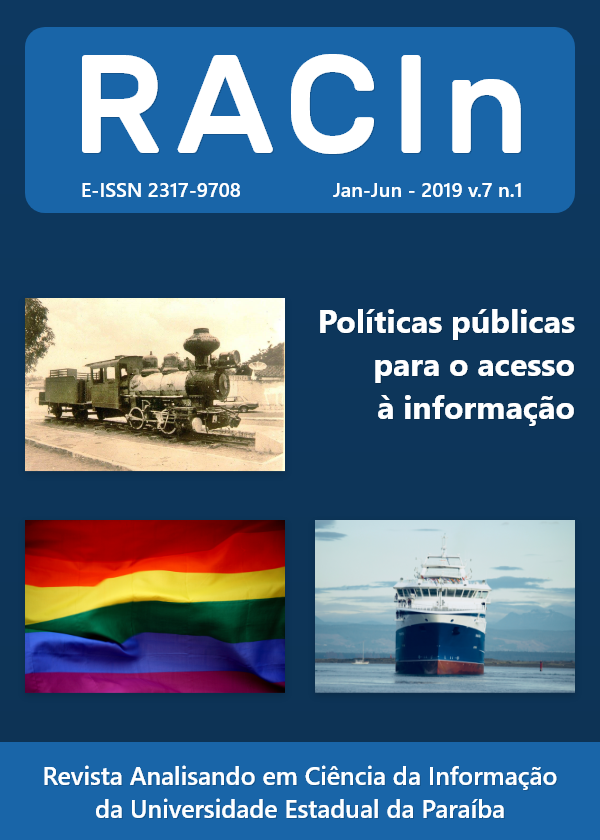THE INFORMATION ACCESS LAW IN THE BRAZILIAN NAVY
A MAPPING OF PASSIVE TRANSPARENCY IN THE INSTITUTION
Keywords:
Access to Information Law, Brazilian Navy, Passive TransparencyAbstract
This article aims to map this type of transparency in the Brazilian Navy, based on the analysis of the data provided by e-SIC, an Internet platform that registers and monitors requests for information from citizens to the Federal Executive Branch. Such an electronic system was created to meet the requirements of LAI and contains a series of data on the requests for information and how they were answered or not. The research carried out covers the period from May 2012 to October 2018, that is, it covers the first six years and five months of implementation of the standard. In addition to this documentary research, we also conducted semi-structured interviews with the responsible for the Citizen Information Service (SIC) of the Navy, whose objective is to understand how LAI-related processes are handled internally. The main aspects observed in the survey indicate that the number of requests increased during the first four years, when a reduction in the number of requests for information began. It was also noted that most of the institution's claimants are men, with seniors and residents of the Southeast. The survey also showed that the main reasons cited by citizens to justify the filing of appeals are the receipt of incomplete information or not corresponding to what was requested, which may indicate limitation of understanding by the citizens or a refractory attitude of the institution regarding the release of information. As the structure created to meet the requirements of LAI was inserted within the organization chart of the Office of Communication, it appears that there is potential to allow the culture of access to information to be better worked within the military culture.
References
BRASIL. Constituição (1988). Constituição Federal. Disponível em: http://www.planalto.gov.br/ccivil_03/constituicao/constituicao.htm. Acesso em: 30 out. 2018.
BRASIL. Decreto N° 7.724, de 16 de maio de 2012. Regulamenta a Lei n. 12.527, de 18 de novembro de 2011. Disponível em: http://www.planalto.gov.br/ccivil_03/_ato2011-2014/2012/Decreto/D7724.htm. Acesso em: 30 out. 2018.
BRASIL. CONTROLADORIA GERAL DA UNIÃO. Acesso à informação pública: uma introdução à Lei 12.527, de 18 de novembro de 2011. Brasília: CGU, 2011 [Cartilha].
CORDEIRO, Helena Cristina Duarte; GOMES, Claudiana Almeida de Souza; LIMA, Marcia H. T. de Figueredo. Antecedentes e perspectivas do direito à informação no Brasil. In: Moura, Maria Aparecida (Org.). A construção social do acesso público à informação no Brasil: contexto, historicidade e repercussões. Belo Horizonte: UFMG, 2014.
LAKATOS, Eva Maria; MARCONI; Marina de Andrade. Metodologia científica. 7. ed. São Paulo: Atlas, 2017.
MENDEL, Toby. Liberdade de informação: um estudo de direito comparado. Brasília: UNESCO, 2009.
PAULINO, Fernando de Oliveira; SILVA, Luiz Martins. Jornalismo, transparência e aplicação da Lei de Acesso à Informação nas Universidades Federais. In: 10º Encontro Nacional de Pesquisadores em Jornalismo da Associação Brasileira de Pesquisadores em Jornalismo (SBPJor), Curitiba, 2012. Disponível em: http://www.sbpjor.org.br/sbpjor/?p=11689. Acesso em: 30 out. 2018.
SILVA, Shirlene Linny. Transição política e a construção do direito de acesso aos arquivos da/sobre a repressão. In: MOURA, Maria Aparecida (Org.). A construção social do acesso público à informação no Brasil: contexto, historicidade e repercussões. Belo Horizonte: UFMG, 2014.
Downloads
Published
How to Cite
Issue
Section
License
Copyright (c) 2024 Revista Analisando em Ciência da Informação

This work is licensed under a Creative Commons Attribution-NonCommercial-NoDerivatives 4.0 International License.
As publicações da RACIn estão licenciados sob a Licença Creative Commons CC BY-NC.





